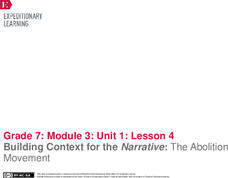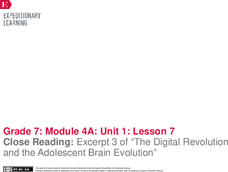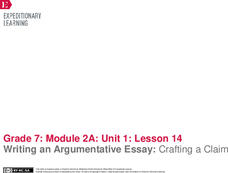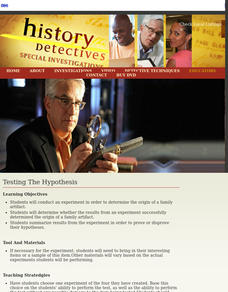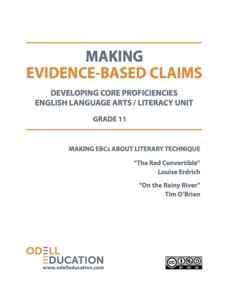EngageNY
Forming a Research-Based Claim: Comparing Cascading Consequences
It's time to weigh the risks and benefits of screen time! Pupils work in triads to identify the strongest positive and negative consequences from their Cascading Consequences chart. Next, using the chart and their researcher's notebooks,...
EngageNY
Building Context for the Narrative: The Abolition Movement
That's history. Scholars work together to review the text Abolition and its accompanying text-dependent questions. They then determine what information to add to the Historical Context anchor chart. For homework, individuals think of...
EngageNY
Close Reading: Excerpt 3 of “The Digital Revolution and the Adolescent Brain Evolution”
It's time to level up and discover how video games affect the brain. Pupils explore the topic as they continue reading excerpts from an article about adolescent brain development and the digital revolution. Scholars also participate in a...
Education Bureau of Hong Kong
Decision-Making
Designed to be included in the fourth lesson in the "Learning and Teaching of Critical Thinking Skills" series, this presentation models for viewers how to use the Decision Making worksheet to weight factors.
EngageNY
World Café about Pygmalion
Round and round you go. Scholars participate in a World Cafe to discuss Pygmalion. As they circulate around to different groups, they talk about three main questions that pertain to the actions of Eliza and Higgins. After circulating,...
EngageNY
Gender and Pygmalion
Scholars take a close look at the role of gender presented in Pygmalion. They work in pairs to complete Gender Excerpts and Text-Dependent Questions. To finish, classmates discuss the role gender plays in the United States today.
EngageNY
Writing an Argumentative Essay: Analyzing the Model Essay
Models and exemplars help pupils learn. Scholars read a model argumentative essay to prepare for an upcoming writing assignment. As they read, they work with partners to complete a worksheet analyzing the essay's structure.
EngageNY
Writing an Argumentative Essay: Crafting a Claim
As scholars prepare to craft their essays based on Katherine Paterson's Lyddie, they learn about using compelling reasons in their writing. Next, they develop a claim about whether Lyddie should sign a petition to speak out against...
EngageNY
Scaffolding to Essay: Using Details to Support a Claim
Show me the evidence. Writers analyze the Command of Evidence row of the rubric for A Long Walk to Water essay. Pupils work in pairs to determine how the writer of a model essay meets the demands of the rubric. They then use a Forming...
EngageNY
End of Unit Assessment: Claims, Interactions, and Structure in “Is Money Affecting Your Social Status?”
It's not about the money. Scholars use the text Is Money Affecting Your Social Status? to complete their end-of-unit assessments. After finishing the assessment, they discuss how the text relates to their working definition of identity...
EngageNY
End of Unit 3 Assessment: Using Strong Evidence
Young poets view a model two-voice poem while discussing capitalization and punctuation. Pupils also complete an end-of-unit assessment about using strong evidence to support a literary analysis.
PBS
Who Knows Best
Finding an expert in a given field when conducting research can be a challenge. This guide provides step-by-step directions as well as links to resources that help young sleuths find the authorities and experts they need. As a bonus, two...
PBS
Predicting/Making a Hypothesis
As an introduction to the hypothesis and testing method of investigation, young history detectives engage in a special investigation of a family artifact. After watching a short video that demonstrates the method, they develop a...
PBS
Testing The Hypothesis
After choosing one experiment from the four they conducted in the previous lesson, young investigators analyze the evidence they collected to determine if it proves or disproves their original hypothesis.
EngageNY
Evaluating an Argument: The Joy of Hunting
After listening to "Interview with an Organic Farmer," class members identify the claim the farmer makes in his interview. They use lined paper to create a four-square organizer for relevant evidence, sufficient evidence, irrelevant...
EngageNY
Informational Essay Planning: Studying the Essay Prompt and Gathering Evidence
Using a Gathering Evidence note-catcher, readers record evidence in A Mighty Long Way and Little Rock Girl 1957. They then use the evidence to analyze and discuss different mediums with their peers. Lastly, they look at a writing prompt...
EngageNY
Analyzing the Power of Different Mediums: A Mighty Long Way
Weigh the pros and cons. Class members continue sharing their thoughts on media and events by watching the video John Chancellor Reports on the Integration at Central High School. They discuss the advantages and disadvantages of gaining...
EngageNY
Advantages and Disadvantages of Various Mediums: The Montgomery Bus Boycott Speech
Text, speech, phone call. Scholars discuss the advantages and disadvantages of using speech and written text to express ideas. They use an Analyzing Mediums graphic organizer to analyze speeches by Martin Luther King Jr. They then...
National Woman's History Museum
Creating a Historical Thesis Statement
A strong thesis statement not only identifies the subject of an essay but also presents a claim that must be supported with evidence. After researching how nursing has evolved in the United States since the Colonial era, young writers...
EngageNY
Preparation for Performance Task: Practicing Presentations
Practice makes progress. Working in pairs, presenters rehearse and refine their presentation skills before the big day when they pitch their film choices. Rehearsing also allows for refining prompt cards based on peer feedback and...
EngageNY
Analyzing the Central Claim and Supporting Claims: “The Shakespeare Shakedown”
Scholars continue to analyze Simon Schama's article "The Shakespeare Shakedown." They participate in a jigsaw discussion to identify the author's argument and supporting claims. Pupils also write objective summaries of the text.
California Education Partners
My Librarian is a Camel
A two-part assessment challenges scholars to gather information from reading then write an opinion piece. In part one, learners read, take notes, and answer text-related questions. In part two, participants use their new-found knowledge...
Odell Education
Making Evidence-Based Claims: Grade 9
Sorry, Charlie. Scholars take a close look at Apology by Plato. Activities analyzing the text help pupils understand, make, organize, and write about claims. Learners work in groups, complete claim tools, and evaluate thinking by filling...
Odell Education
Making Evidence-Based Claims Literary Technique: Louise Erdrich and Tim O’Brien
Take a ride in The Red Convertible by Louise Erdrich. Students read the story and discuss whether a car is really a character. After carrying out several activities using graphic organizers and tools for making their claims in The Red...



